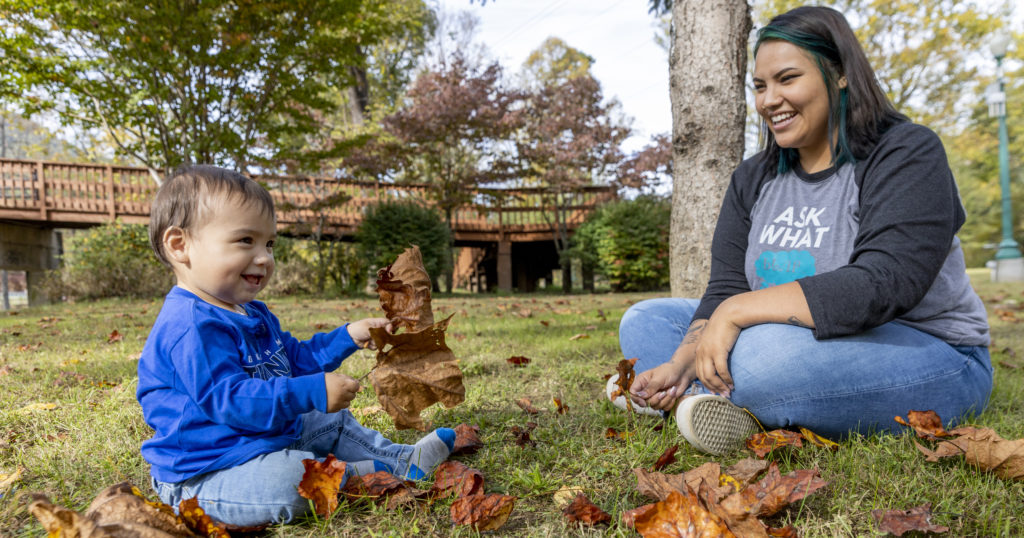
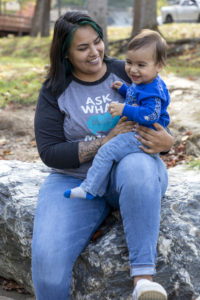
Eastern Band of Cherokee Indians and Nurse-Family Partnership Work Together to Serve Families
The charge for Sheena Kanott Lambert, public health director for the Eastern Band of Cherokee Indians in North Carolina, was to assess the maternal health needs of the tribal community and develop a plan to address them. It was 2011 and, in the wake of the Great Recession and the midst of the nationwide opioid epidemic, it was clear that an approach was needed to empower Cherokee families to achieve better outcomes.
“We interviewed pregnant moms and other stakeholders, including pediatricians and prenatal providers,” said Lambert, an enrolled member of the Eastern Band of Cherokee Indians and the previous Nurse-Family Partnership program director with the tribe. “Our community also had phenomenal leaders and advocates who knew the importance of early childhood interventions and impact of Adverse Childhood Experiences.”
The consensus was unequivocal. The people wanted the National Service Office to bring Nurse-Family Partnership ® (NFP) to collaborate with families in the Cherokee sovereign nation.
“The community really loved Nurse-Family Partnership’s evidence-based model because it had nurses as the driving force behind the program,” Lambert said.
The needs assessment found that some other programs rely on social workers and “social workers sometimes have a negative stigma here, especially with children and families,” she said. “The nurses are well respected and have really good rapport with the community.”
About 16,000 enrolled tribal members live in the region, which includes the Qualla Boundary community of western North Carolina. It is served by three NFP nurses and their supervisor, Tricia Carver.
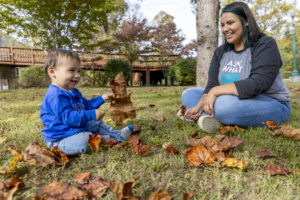
Nurse-Family Partnership (NFP) works with a community advisory board to build relationships and make sure nurses are culturally competent and sensitive to the tribe’s traditions and values.
The program has helped improve communication between young moms and health care providers, Carver said, and usually serves around 75 moms at a time.
“When we discuss labor and delivery with pregnant moms, we try to empower them to be their own patient advocates,” Lambert said. “We emphasize that birth is a natural process, and you have rights. Sometimes the nurses were met with resistance from moms who were shy and think what the doctor says is all there is.”
Michelle Raby is a member of the Cherokee community and brought experience in maternal health and pediatrics when she became an NFP nurse two years ago.
“Most of the women could be my daughters,” she said. “I know their moms or grandmothers and aunts. I usually know the families they come from and what they will listen to and what they won’t.”
Elizabeth Bible, 25, is a family services worker for the Public Health & Human Service Division for the Eastern Band of Cherokee Indians and was referred to Nurse-Family Partnership when she was pregnant with her son, Iliyah, who was born on Sept. 10, 2020.
She was working on her master’s degree in social work and had a history of anxiety, so her nurse, Ann Mehaffey, monitored her carefully throughout her pregnancy and watched for any signs of post-partum depression after the baby was born. Even with her advanced education, Bible was grateful for the help in navigating a health care system characterized by deep and longstanding inequalities between Native and non-Native communities.
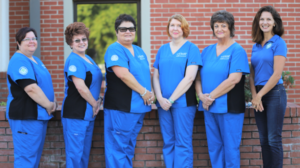
“Ann was very forward with me,” Bible said. “She is non-Native and on several different occasions she asked my opinion on what she could do better.”
Bible said she “does great overall, and is very encouraging and supportive,” but offered suggestions based on her personal experience as well as her educational background. Bible has a BA in Native American studies.
One challenge for the nurses is to persuade Cherokee moms to breastfeed.
“Before I had my baby, I didn’t know if I wanted to breastfeed,” Bible said.
The practice had declined in the tribal community and NFP nurses are working hard to encourage it.
Ultimately, Bible chose to breastfeed Iliyah. “I’m happy I did. At 13 months we’re still going strong. I’m loving it,” she said.
So, when Mehaffey asked her how to help other Cherokee moms understand the importance of breastfeeding, Bible suggested she talk about it from a historical perspective.
“In reality, a lot of moms would think this is just another white woman coming in and saying you need to breastfeed, and they may not take that,” she said. “But if she comes at it from the cultural perspective and how historically indigenous people always breastfed their babies, they might say, ‘Oh, that sounds like a good thing.’ ”
Lambert said the nurses are skilled at recognizing and dealing with people who suffer from historical grief and trauma.
“We’re all trying to break those generational traumas,” she said. “The nurses play a critical role in helping guide moms and providing education so they can make the choices themselves toward having a healthy baby and a good life.
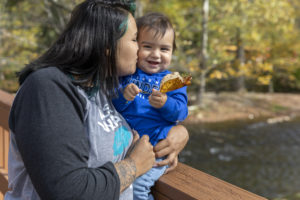
“Sometimes, it can be difficult, but there are so many success stories. Moms have gone on to school – one has become a nurse; another shares her story about overcoming postpartum depression in a video for other moms.
“I’m truly grateful this tribe has taken the opportunity to see the need and have this important program in the community.”
Photo credit: Kristy Herron

